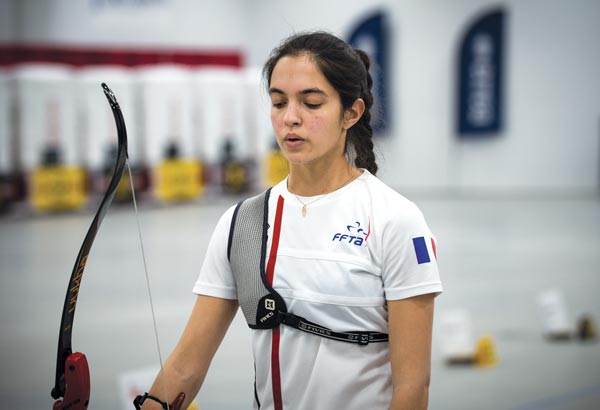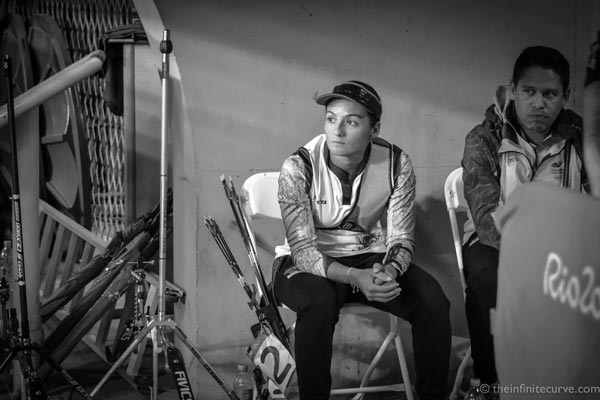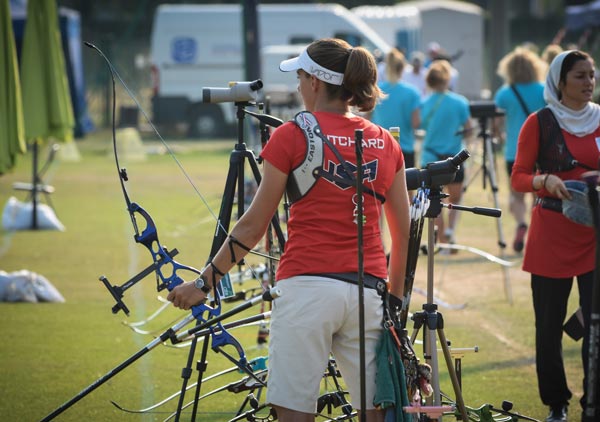Crystal Gauvin gives us the low-down on strategies for keeping calm when competing

Breathing exercises could help you to maintain confidence in competitions
Competitive anxiety manifests itself differently in every athlete. Although the symptoms vary across individuals, they generally fall into one of three categories: Cognitive, Somatic (Physical), or Behavioural.
Cognitive symptoms are those that relate to thought processes and include things like fear, negative thoughts, sense of confusion, indecision, poor concentration, defeatist self-talk, loss of confidence, and irritability.
Somatic symptoms consist of things like muscular tension, clammy hands or feet, increased heart rate and/or blood pressure, dry mouth, twitching, vomiting, loss of appetite, sleeplessness, sweating, or ‘butterflies in the stomach’.
Behaviour symptoms are those associated with patterns of observable activities such as inhibited posture, fingernail biting, avoidance of eye contact, lethargic movements, fidgeting, and uncharacteristic displays of introversion or extroversion.

Competitive anxiety manifests itself differently in every athlete
In my experience as a competitor and as a coach, I have seen athletes fall into two main categories. The first group includes those that get nervous before competition begins, but they quickly become confident once they begin playing. (In fact, I’ve known players that can stay calm under tough situations during tournaments, but they can’t eat before their events or they will throw up).
The second group consists of athletes whose nervousness translates directly to the field of play. These individuals are worried about making mistakes and they can’t get physical symptoms under control, which then causes them to become less effective in competition settings.
It’s essentially impossible to eliminate all your nerves (we aren’t robots), but most experts agree you wouldn’t want to, even if you could. Being a little nervous is not only NOT a detriment to your performance, but it can actually give you an advantage.
When your brain perceives a threat, whether that is a physical or psychological threat, it starts pumping chemicals through your body. As your heart beats faster, your blood pressure increases, and your senses sharpen. Feeling pumped up allows you to perform tasks more efficiently and can improve your memory. That is essentially the difference between group one and group two above – those that use the nerves to their advantage and those that let the nerves overtake them.
So how does an athlete in group two learn to manage their nerves in a way that moves them into (or at least closer) to the first group? There are numerous approaches and strategies out there. The key to all of this is learning YOUR body and YOUR response under stressful environments. As a coach, I always push my students to jump into tournaments before they feel ready. It’s important to put yourself in situations where nerves will be present to see how you naturally react, and better assess where your weaknesses are and how to tackle them.

Behaviour symptoms are those associated with patterns of observable activities
Here are 8 steps to help you manage your nerves in competition
Step 1: Be good to yourself
Start by taking care of yourself before the big day. It’s easy to let taking care of yourself slip as you spend more and more time practicing, preparing or packing for a tournament. However, you’ll look and feel your best come tournament day if you get enough sleep and eat healthy meals beforehand. Exercise also can help as a way of keeping those stress hormones from getting out of control.
Step 2: Focus on your breathing
Another strategy involves using meditation to focus on your breathing. Whenever you’re feeling stressed in the hours or minutes leading up to your competition start, immediately switch your focus to your breath. Deliberately try to slow and deepen your breathing. Whenever intrusive thoughts about the upcoming event enter your head, quickly return your focus to the feel and rhythm of your breath. This technique will be far more effective for you if you regularly practice each day. One simple way to do this is by repeating this exercise every night for a few minutes right before you fall asleep.
Step 3: Be ready for anything
Being prepared is another way to effectively combat your nerves. You are much less likely to panic or freeze up if you’re well prepared. Rehearse as much as you can and practise all scenarios you may encounter – the more opportunities you give yourself, the better. Practice until you feel relaxed and ready. Nothing calms nerves like the confidence that comes from knowing you’re prepared.
Step 4: Watch where your attention goes
Another “secret” to controlling your nerves is to stop paying attention to your opponent(s) and other things out of your control. Thinking about your competition and their scores, strengths, or even their reputation, will just distract you from your own capabilities. Also, concentrating on wanting to beat someone or focusing on things you have no direct control over will not calm you, but likely send your nerves through the roof, undermine your confidence, and ultimately sabotage your game.
The key is to be disciplined enough to keep your focus on YOU and only the job at hand. Instead of concentrating on things out of your control, play your own game and stay centered. You can even ask yourself, “Do I have direct control over what I’m thinking about right now?” If the answer is no, try to switch your thoughts and focus to something that you can control. This will help you remain calm both before and during your event, so you can perform at your best.

Put things in to perspective to try and manage your nervous symptoms
Step 5: Keep it balanced
A simple, yet often forgotten about, technique is to put things in perspective. I always remind my athletes, win or lose, your friends will still be your friends and your “enemies” will still be your enemies. Don’t let nervous feelings stop you or intimidate you. Just let them be there. It’s not performing brain surgery – your competition is not a life or death situation! If you put too much pressure on yourself to win or score well, chances are good that you will stress yourself and underachieve. Instead, I recommend going into a competition focusing firstly on having fun and second the process of your performance. Think of just one arrow at a time or one part of your shot process, rather than about the entire score or competition. Leave everything else at home, because you can’t change anything once you are on the line shooting for score!
Step 6: Start talking
Some athletes find talking to their friends or teammates during a competition make a significant difference. Doing so allows them to relax and take their focus away from the stress of the tournament. For example, if you’ve ever been to a tournament with both professionals and amateurs, you’ll probably quickly notice one major difference: the professionals are more laid back and relaxed. Between ends you will see them talking, joking around with one another, or listening to music to help them relax and not think about the stress of the competition. The amateurs on the other hand will appear more stressed, not talking amongst themselves, and looking more serious overall.

Having rituals could help you keep tabs on your competition anxiety
Step 7: Think about the downtime
There is a lot of research out there that talks about the importance of preparing for pre-performance jitters as well. I read a great article once about a young music performer getting ready for a major audition. His parents made sure he didn’t just practice his piece, but he practised wearing his audition outfit and standing in a hallway waiting 5-10 minutes for it to be his turn. I liked this example because it reminds me of the time spent in the on-call area, waiting to take the stage before a finals match. You will never be able to calm down out-of-control nerves unless you can learn to control your pre-performance focus of concentration.
In archery tournaments there is usually some (or a lot of) waiting around. It’s important to find something to help you learn to relax during the wait. Some people take along inspirational photos, put together a playlist, play a game on their phone, or learn breathing techniques (see above) to help them feel calm. Some people need to be active to relax, while others need to be still and calm. It’s important to try different strategies and find which one works best for you.
Step 8: Making rituals work for you
We’ve all heard of pro athletes and their ‘lucky socks’. Have you ever noticed that Serena Williams must bounce the ball five times before her first serve, then twice before her second serve? Society likes to make fun of these sporting rituals, but there is a lot of evidence that they work. Sports are filled with elements beyond your control, so performing the same set of steps every time creates a feeling of being in control which calms your mind and your body.
The key is to not create a super rigid ritual (like eating 20 almonds 30 minutes before go-time or refusing to touch anything blue), as you’ll be negatively affected if things change (e.g. your start time gets moved or your lucky pen runs out of ink). If your ritual is too specific or inflexible, it’s easy to get in a situation where you can’t perform it. Rituals that are effective and useful for performance are things you can do anywhere and at any time: e.g. tying your shoes, or pressing your thumb and middle finger together. By having more flexible pregame rituals, you can adapt and won’t be completely out of sorts. It’s important that you are in charge of your pre-game ritual, not the other way around.
In the end, it’s up to you to figure out which techniques will work for you. Just like you must shoot arrows in order to improve, you must also practice methods of calming your nerves and competing with them, in order to handle the stresses of a competition. There is no right or wrong answer or ‘one size fits all’ that works for everyone. Only through trial and error will you be able to find what works for you. But ultimately, you should remember that competition nerves are natural and happen to everyone.
This article originally appeared in the issue 123 of Bow International magazine. For more great content like this, subscribe today at our secure online store www.myfavouritemagazines.co.uk

